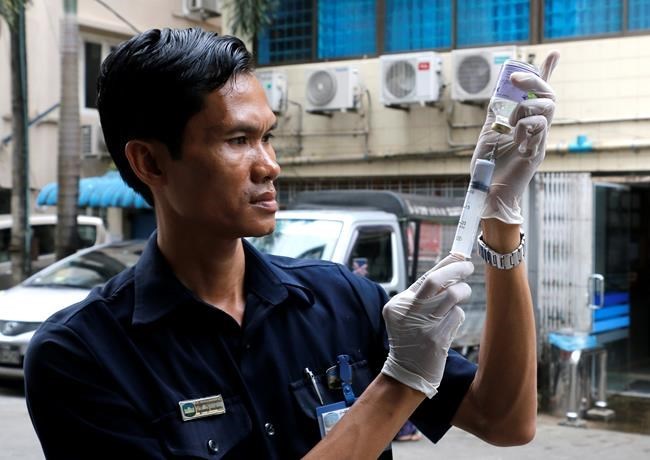
A Yangon City and Development Committee (YCDC) member prepares an anesthesia injection to catch stray dogs in Yangon, Myanmar, Thursday, Oct. 6, 2016. Myanmar’s largest city is capturing some of its tens of thousands of stray dogs to neuter and vaccinate them to combat rabies. (AP Photo/Thein Zaw)
Republished October 06, 2016 - 4:26 AM
Original Publication Date October 06, 2016 - 3:10 AM
YANGON, Myanmar - Myanmar's largest city, Yangon, is capturing some of its tens of thousands of stray dogs, using blowpipes to sedate them for neutering and vaccinations to combat a rabies epidemic.
The roundups began after animal lovers in the city objected to efforts to reduce the population of stray dogs by poisoning them.
At a crowded downtown area Thursday, officials used blowpipes to shoot the dogs with tranquilizer darts. Once the dogs were sedated, their legs were tied and mouths muzzled and veterinarians neutered them.
Stray dogs are commonplace in Myanmar and other parts of Southeast Asia, tolerated but generally left to fend for themselves. Since few of the animals get vaccinated, the region suffers a high incidence of rabies, which is almost always fatal in humans. About 1,000 people contract the disease in Myanmar every year and thousands more are treated after getting bitten.
So far the city has neutered about 150 male dogs and vaccinated 270 male and female strays.
Some Yangon residents feed the dogs out of a belief in the Buddhist religion that they will win "merit" for such kindness. Many strays are relatively tame as a result, sleeping calmly on pavements and under cars. But catching them is not always easy, said animal control officer Soe Thura, who has been practicing using a blowpipe for a few months.
"We have to follow them everywhere and sometimes I lose them," he said. "Some are just very difficult to catch."
Yan Myo Aung, a doctor in a local Veterinary and Slaughter House department, said some areas were still poisoning dogs, but he hoped the practice would die out.
"According to our religion, it's a bad thing to do. It's a sin. But on the other hand, people are desperate about the surge in the number of stray dogs and so afraid of getting rabies," he said.
News from © The Associated Press, 2016